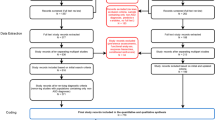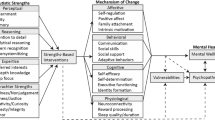Abstract
Parent, teacher, and self-perceptions of 54 high ability students with autism spectrum disorder (ASD) were assessed through administration of the Behavioral Assessment Scales for Children, Second Edition. Parent reports resulted in clinically elevated scores on the Atypicality, Attention Problems, Depression, Hyperactivity, Withdrawal, Activities of Daily Living, Adaptability, and Social Skills subscales, and teacher reports resulted in clinically elevated scores on the Atypicality, Depression, Withdrawal, and Adaptability subscales. Self-report scores were in the average range. Parents and teachers of adolescents reported greater adaptability and fewer symptoms of atypicality than parents and teachers of children. Psychosocial functioning appears impacted in high ability students with ASD and developmental differences in severity may exist.
Similar content being viewed by others
References
American Psychiatric Association. (2000). Diagnostic and statistical manual of mental disorders (4th ed., text rev.). Washington, DC: American Psychiatric Association.
Asperger, H. (1944). Die “autistischen Psychopathen”. Kindesalter Archives fur Psychiatri und Nervenkrankheiten, 117, 76–136.
Asperger, H. (1991). Autistic psychopathy in childhood. In U. Frith (Ed.), Autism and Asperger syndrome (pp. 37–92). Cambridge, UK: Cambridge University Press.
Assouline, S. G., Foley Nicpon, M., & Doobay, A. (2009). Profoundly gifted girls and autism spectrum disorder: A psychometric case study comparison. Gifted Child Quarterly, 53(2), 89–106.
Barnhill, G. P., Hagiwara, T., Smith Myles, B., Simpson, R. L., Brick, M. L., & Griswold, D. E. (2000). Parent, teacher, and self-report of problem and adaptive behaviors in children and adolescents with Asperger syndrome. Diagnostique, 25, 147–167.
Bauminger, N., & Kasari, C. (2000). Loneliness and friendship in high-functioning children with autism. Child Development, 71, 447–456.
Bellini, S. (2004). Social skill deficits and anxiety in high-functioning adolescents with autism spectrum disorders. Focus on Autism and Other Developmental Disabilities, 19, 78–86.
Carrington, S., Templeton, E., & Papinczak, T. (2003). Adolescents with Asperger syndrome and perceptions of friendship. Focus on Autism and other Developmental Disabilities, 18, 211–218.
Foley Nicpon, M., Allmon, A., Sieck, R., & Stinson, R. D. (2009). Empirical investigation of twice-exceptionality: Where have we been and where are we going? Manuscript under review.
Fombonne, E. (2005). Epidemiological studies of pervasive developmental disorders. In F. R. Volkmar, R. Paul, A. Klin, & D. Cohen (Eds.), Handbook of autism and pervasive developmental disorders (3rd ed., pp. 42–69). Hoboken, NJ: Wiley.
Gillberg, C. (1984). Autistic children growing up: Problems during puberty and adolescence. Developmental Medicine and Child Neurology, 26, 125–129.
Gillberg, C., & Steffenberg, S. (1987). Outcome and prognostic factors in infantile autism and similar conditions: A population-based stud of 46 cases followed through puberty. Journal of Autism and Developmental Disorders, 17, 27–287.
Gillott, A., Furniss, F., & Walter, A. (2001). Anxiety in high-functioning children with autism. Autism, 5, 277–286.
Kanner, L. (1942). Autistic disturbances of affective contact. Nervous Child, 2, 217–250.
Komoto, J., Usui, S., & Hirata, J. (1984). Infantile autism and affective disorder. Journal of Autism and Developmental Disorders, 14, 81–84.
Lord, C., Rutter, M., DiLavore, P. C., & Risi, S. (2003). Autism diagnostic observation schedule. Los Angeles, CA: Western Psychological Services.
Loveland, K. A., & Tunali-Kotoski, B. (2005). The school-age child with an autism spectrum disorder. In F. R. Volkmar, R. Paul, A. Klin, & D. Cohen (Eds.), Handbook of autism and pervasive developmental disorders (3rd ed., pp. 247–287). Hoboken, NJ: Wiley.
Macintosh, K., & Dissanayake, C. (2006). Social skills and problem behaviours in school aged children with high-functioning autism and Asperger’s disorder. Journal of Autism and Developmental Disorders, 36(8), 1065–1076.
Meyer, J. A., Mundy, P. C., Vaughan Van hecke, A., & J. S., Durocher. (2006). Social attribution processes and comorbid psychiatric symptoms in children with Asperger syndrome. Autism, 10, 383–402.
Nordin, V., & Gillberg, C. (1998). The long-term course of autistic disorders: Update on follow-up studies. Acta-Psychiatrica-Scandinavica, 97, 99–108.
Ozbayrak, K. R., Kapucu, O., Erdem, E., & Aras, T. (1991). Left occipital hypoperfusion in a case with the Asperger syndrome. Brain and Development, 13, 454–456.
Reynolds, C. R., & Kamphaus, R. W. (1992). Behavior assessment system for children. Circle Pines, MN: AGS Publishing.
Reynolds, C. R., & Kamphaus, R. W. (2004). Behavior assessment system for children (2nd ed.). Circle Pines, MN: AGS Publishing.
Rutter, M., Le Couteur, A., & Lord, C. (2003). Autism diagnostic interview-revised. Los Angeles, CA: Western Psychological Services.
Seltzer, M. M., Krauss, M. W., Shattuck, P. T., Orsmond, G., Swe, A., & Lord, C. (2003). The symptoms of autism spectrum disorders in adolescence and adulthood. Journal of Autism and Developmental Disorders, 33, 565–581.
Shaked, M., & Yirmiya, N. (2003). Understanding social difficulties. In M. Prior (Ed.), Learning and behavior problems in Asperger syndrome. New York: Guilford Press.
Shea, V., & Mesibov, G. B. (2005). Adolescents and adults with autism. In F. R. Volkmar, R. Paul, A. Klin, & D. Cohen (Eds.), Handbook of autism and pervasive developmental disorders (3rd ed., pp. 288–311). Hoboken, NJ: Wiley.
Sparrow, S., Cicchetti, D., & Balla, D. (2005). Vineland adaptive behavior scales (2nd ed.). Circle Pines, MN: American Guidance Service.
Wechsler, D. (1997). Wechsler adult intelligence scale (3rd ed.). San Antonio, TX: The Psychological Corporation.
Wechsler, D. (2003). Wechsler intelligence scale for children (4th ed.). San Antonio, TX: The Psychological Corporation.
Wing, L. (1981). Asperger’s syndrome: A clinical account. Psychological Medicine, 11, 115–129.
Acknowledgments
This research was supported in part by a grant from the U.S. Department of Education Jacob K. Javits Program obtained by the Iowa Department of Education and the Belin-Blank International Center for Gifted Education and Talent Development.
Author information
Authors and Affiliations
Corresponding author
Rights and permissions
About this article
Cite this article
Foley Nicpon, M., Doobay, A.F. & Assouline, S.G. Parent, Teacher, and Self Perceptions of Psychosocial Functioning in Intellectually Gifted Children and Adolescents with Autism Spectrum Disorder. J Autism Dev Disord 40, 1028–1038 (2010). https://doi.org/10.1007/s10803-010-0952-8
Published:
Issue Date:
DOI: https://doi.org/10.1007/s10803-010-0952-8




